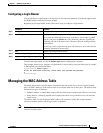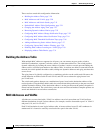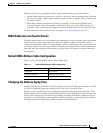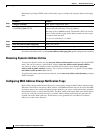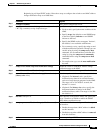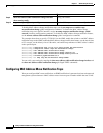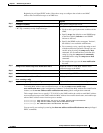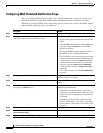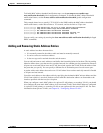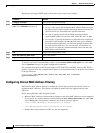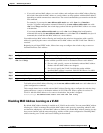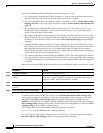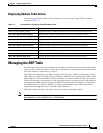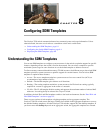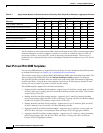
7-27
Catalyst 3750 Switch Software Configuration Guide
OL-8550-09
Chapter 7 Administering the Switch
Managing the MAC Address Table
To disable MAC address-threshold notification traps, use the no snmp-server enable traps
mac-notification threshold global configuration command. To disable the MAC address-threshold
notification feature, use the no mac address-table notification threshold global configuration
command.
This example shows how to specify 172.20.10.10 as the NMS, enable the MAC address threshold
notification feature, set the interval time to 123 seconds, and set the limit to 78 per cent.
Switch(config)# snmp-server host 172.20.10.10 traps private mac-notification
Switch(config)# snmp-server enable traps mac-notification threshold
Switch(config)# mac address-table notification threshold
Switch(config)# mac address-table notification threshold interval 123
Switch(config)# mac address-table notification threshold limit 78
You can verify your settings by entering the show mac address-table notification threshold privileged
EXEC commands.
Adding and Removing Static Address Entries
A static address has these characteristics:
• It is manually entered in the address table and must be manually removed.
• It can be a unicast or multicast address.
• It does not age and is retained when the switch restarts.
You can add and remove static addresses and define the forwarding behavior for them. The forwarding
behavior defines how a port that receives a packet forwards it to another port for transmission. Because
all ports are associated with at least one VLAN, the switch acquires the VLAN ID for the address from
the ports that you specify. You can specify a different list of destination ports for each source port.
A packet with a static address that arrives on a VLAN where it has not been statically entered is flooded
to all ports and not learned.
You add a static address to the address table by specifying the destination MAC unicast address and the
VLAN from which it is received. Packets received with this destination address are forwarded to the
interface specified with the interface-id option.
When you configure a static MAC address in a private-VLAN primary or secondary VLAN, you should
also configure the same static MAC address in all associated VLANs. Static MAC addresses configured
in a private-VLAN primary or secondary VLAN are not replicated in the associated VLAN. For more
information about private VLANs, see Chapter 16, “Configuring Private VLANs.”



